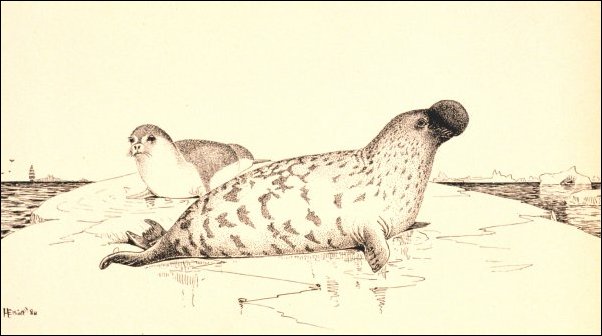|
There
are two stocks of hooded seals; one in the north west Atlantic and
one in the Greenland Sea. They breed in 4 main areas; the Gulf of
Saint Lawrence; the east of Newfoundland; in the Davis Strait between
Greenland and north Canada; and on the ice near Jan Mayen island.
The current world population is 500,000-700,000.
These
silvery-grey seals have scattered dark spots. Mature males have
an inflatable "hood" on top of the head and can also inflate
their nasal septum through the nostrils to form a red balloon-like
bladder. They were often called bladder seals by the Peterhead whalers.
Hooded
seals eat deepwater fish, such as halibut, and squid.
Sexual
maturity is reached at 3-5 years and live for 30-40 years. Rather
loose aggregations of females give birth to single pups on heavy
drifting pack ice in the second half of March. They have the shortest
lactation period of any mammal. The young weigh 20 kg at birth and
are weaned after just 4 days, when they weigh 40 kg!
 National
Oceanic and Atmospheric Administration
National
Oceanic and Atmospheric Administration
Hooded seals |
The
drawing comes from NOAA's National Marine Fisheries Historical Image
Collection - Over 532 etchings from the 1880s illustrating the various
species of marine mammals, fish, and shellfish.
|